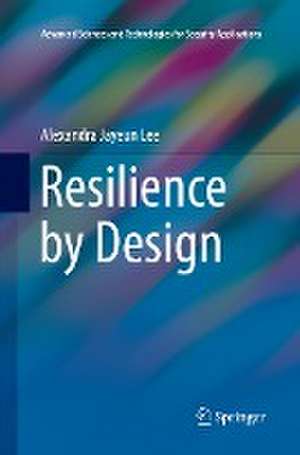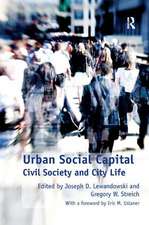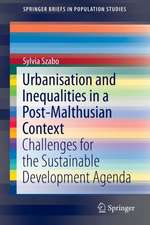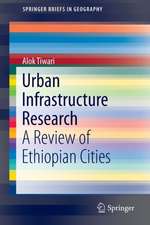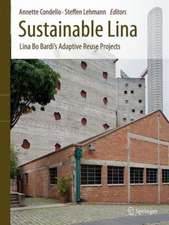Resilience by Design: Advanced Sciences and Technologies for Security Applications
Autor Alexandra Jayeun Leeen Limba Engleză Paperback – 25 apr 2018
The book revisits the recent catastrophic events: the earthquakes in Port-au-Prince and Christchurch, and the hurricane in New Orleans, and places emphasis on the social, cultural, and political processes of rebuilding houses, facilities, and infrastructure that often go unnoticed. Understanding the wider context for how a built project comes to be, the author argues, is a solid indicator of its longevity than by the measure of itsmaterial characteristics alone, and gives us reasons to question the validity of our intentions as designers of the future. This book provides strategies for thinking about, assessing, and developing ways for place-makers from all disciplines to become responsible citizen designers of our cities.
| Toate formatele și edițiile | Preț | Express |
|---|---|---|
| Paperback (1) | 381.43 lei 43-57 zile | |
| Springer International Publishing – 25 apr 2018 | 381.43 lei 43-57 zile | |
| Hardback (1) | 388.72 lei 43-57 zile | |
| Springer International Publishing – 10 mar 2016 | 388.72 lei 43-57 zile |
Din seria Advanced Sciences and Technologies for Security Applications
- 18%
 Preț: 903.93 lei
Preț: 903.93 lei - 18%
 Preț: 738.20 lei
Preț: 738.20 lei - 18%
 Preț: 969.61 lei
Preț: 969.61 lei - 18%
 Preț: 791.88 lei
Preț: 791.88 lei - 20%
 Preț: 994.92 lei
Preț: 994.92 lei - 15%
 Preț: 643.65 lei
Preț: 643.65 lei - 5%
 Preț: 672.99 lei
Preț: 672.99 lei - 15%
 Preț: 649.22 lei
Preț: 649.22 lei - 20%
 Preț: 1051.84 lei
Preț: 1051.84 lei - 15%
 Preț: 704.36 lei
Preț: 704.36 lei - 17%
 Preț: 491.11 lei
Preț: 491.11 lei - 20%
 Preț: 1162.37 lei
Preț: 1162.37 lei - 15%
 Preț: 644.95 lei
Preț: 644.95 lei - 20%
 Preț: 934.69 lei
Preț: 934.69 lei - 20%
 Preț: 1273.74 lei
Preț: 1273.74 lei - 20%
 Preț: 991.60 lei
Preț: 991.60 lei - 20%
 Preț: 936.37 lei
Preț: 936.37 lei - 20%
 Preț: 889.12 lei
Preț: 889.12 lei - 15%
 Preț: 704.36 lei
Preț: 704.36 lei - 9%
 Preț: 732.28 lei
Preț: 732.28 lei - 18%
 Preț: 783.98 lei
Preț: 783.98 lei - 18%
 Preț: 1223.88 lei
Preț: 1223.88 lei - 20%
 Preț: 480.05 lei
Preț: 480.05 lei - 15%
 Preț: 648.42 lei
Preț: 648.42 lei - 18%
 Preț: 1224.36 lei
Preț: 1224.36 lei - 20%
 Preț: 1068.44 lei
Preț: 1068.44 lei - 18%
 Preț: 734.59 lei
Preț: 734.59 lei - 15%
 Preț: 586.38 lei
Preț: 586.38 lei - 20%
 Preț: 937.81 lei
Preț: 937.81 lei - 18%
 Preț: 1120.18 lei
Preț: 1120.18 lei - 24%
 Preț: 590.42 lei
Preț: 590.42 lei - 18%
 Preț: 1007.17 lei
Preț: 1007.17 lei - 24%
 Preț: 815.83 lei
Preț: 815.83 lei - 24%
 Preț: 747.51 lei
Preț: 747.51 lei - 20%
 Preț: 937.81 lei
Preț: 937.81 lei - 18%
 Preț: 721.30 lei
Preț: 721.30 lei - 15%
 Preț: 646.75 lei
Preț: 646.75 lei - 15%
 Preț: 698.62 lei
Preț: 698.62 lei - 18%
 Preț: 794.07 lei
Preț: 794.07 lei - 18%
 Preț: 738.06 lei
Preț: 738.06 lei -
 Preț: 388.13 lei
Preț: 388.13 lei
Preț: 381.43 lei
Nou
Puncte Express: 572
Preț estimativ în valută:
72.100€ • 75.93$ • 60.26£
72.100€ • 75.93$ • 60.26£
Carte tipărită la comandă
Livrare economică 14-28 aprilie
Preluare comenzi: 021 569.72.76
Specificații
ISBN-13: 9783319808574
ISBN-10: 3319808575
Ilustrații: XXI, 157 p. 23 illus., 1 illus. in color.
Dimensiuni: 155 x 235 mm
Greutate: 0.26 kg
Ediția:Softcover reprint of the original 1st ed. 2016
Editura: Springer International Publishing
Colecția Springer
Seria Advanced Sciences and Technologies for Security Applications
Locul publicării:Cham, Switzerland
ISBN-10: 3319808575
Ilustrații: XXI, 157 p. 23 illus., 1 illus. in color.
Dimensiuni: 155 x 235 mm
Greutate: 0.26 kg
Ediția:Softcover reprint of the original 1st ed. 2016
Editura: Springer International Publishing
Colecția Springer
Seria Advanced Sciences and Technologies for Security Applications
Locul publicării:Cham, Switzerland
Cuprins
Part I.Understanding Resilience.- 1. Design Agency.- Architecture and Disasters.-Dilemmas of Disaster Urbanism.- Bridging the Gap.- 2. Systems Thinking.- Designas a Method.- Operationalizing Wicked Problems.- 3. Paradoxes of Building BackBetter.- Communicating Resilience.- Societal Pathologies.- Design Strategies.-Part II. Resilient Tactics and Strategies.- 4. Haiti: NGO’s Republic.- Settingthe Scene: Wicked Problems.- Civic Resilience: the Haitian Way.- Social Equity:Haitian Diaspora.- Design Outlier: Bati Byen.- 5. Katrina: CollectiveResistance.- Starchitecture and Community Design.- Politics of Unbuilding.-Design Equity.- Public Interest Design as Activism.- 6. Christchurch: GoingGrassroots.- The Polarized City.- Emergent Community Leaders.- A People’sRepublic of Christchurch.- Architecture of Tomorrow.- Conclusion.- Index.- Listof Interviewees.
Textul de pe ultima copertă
This book discusses that disasters, whether natural or man-made, are essentially a human phenomenon. When a city becomes gridlocked and its resources depleted, the collective resilience of those who remain on the ground becomes critical to its immediate survival and recovery. The author argues that in order to build resilient futures for our urban environment, we need more than the skills of architects, engineers, and planners. Support of local communities and policymakers is also needed.
The book revisits the recent catastrophic events: the earthquakes in Port-au-Prince and Christchurch, and the hurricane in New Orleans, and places emphasis on the social, cultural, and political processes of rebuilding houses, facilities, and infrastructure that often go unnoticed. Understanding the wider context for how a built project comes to be, the author argues, is a solid indicator of its longevity than by the measure of itsmaterial characteristics alone, and gives us reasons to question the validity of our intentions as designers of the future. This book provides strategies for thinking about, assessing, and developing ways for place-makers from all disciplines to become responsible citizen designers of our cities.
The book revisits the recent catastrophic events: the earthquakes in Port-au-Prince and Christchurch, and the hurricane in New Orleans, and places emphasis on the social, cultural, and political processes of rebuilding houses, facilities, and infrastructure that often go unnoticed. Understanding the wider context for how a built project comes to be, the author argues, is a solid indicator of its longevity than by the measure of itsmaterial characteristics alone, and gives us reasons to question the validity of our intentions as designers of the future. This book provides strategies for thinking about, assessing, and developing ways for place-makers from all disciplines to become responsible citizen designers of our cities.
Caracteristici
Rediscovery of the Horst Rittel’s framework on design thinking as an effective way to understand post-disaster decision-making process and the design context Consolidates the views of emergent designers and activists Adds an architectural perspective on the international dialogue on urban disaster research Includes supplementary material: sn.pub/extras
